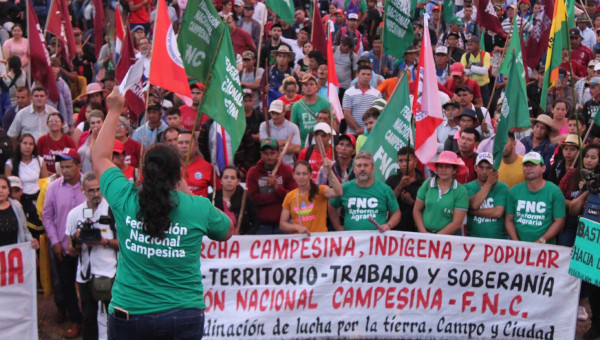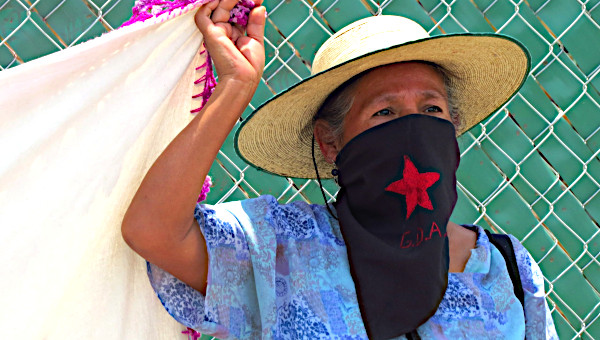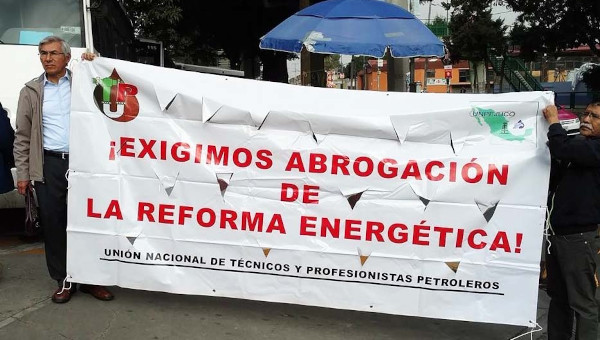Venezuela: The Spectre of Big Oil
“Never again will they rob us – the ExxonMobil bandits. They are imperial, American bandits, white-collared thieves. They turn governments corrupt, they oust governments. They supported the invasion of Iraq.”[1] This was the response from Venezuelan president Hugo Chávez to the successful lawsuit by the world’s biggest corporation (ExxonMobil), freezing $12 billion in assets of Venezuela’s state-owned oil company, PDVSA – a serious escalation in Big Oil’s long running dispute with Chávez and the movement he represents.
ExxonMobil isn’t suing PDVSA because it needs the money. The world’s largest publicly traded corporation recorded profits of $40.6-billion (U.S.) in 2007, up three per cent from 2006’s record of $39.6-billion. “If Exxon were a country, its 2007 profit would exceed output of two-thirds of the world’s nations. Its 2007 revenue of $404-billion (U.S.) would place it among the 30 largest countries, ahead of such middle powers as Sweden and Venezuela.”[2]
ExxonMobil claims it is suing PDVSA because of a June 2007 deadline given by Chávez to Exxon and other Big Oil corporations operating in Venezuela, demanding they cede majority control in their heavy-crude upgrading projects in the country. ExxonMobil and ConocoPhillips filed arbitration requests with the International Center for Settlement of Investment Disputes, and ExxonMobil simultaneously took legal action in courts in the U.S. and Britain, which on February 7 agreed with their claim, and ordered the freeze of PDVSA assets.[3]
But there is much more at stake than a simple legal disagreement. First – many other Big Oil companies have agreed to Chávez’ terms and not gone to court – among them, Chevron Corp., Norway’s Statoil ASA, Britain’s BP PLC and France’s Total SA.[4] Second, Venezuela is not the only country to confront Big Oil and demand that old contracts be renegotiated. Here in Canada, Newfoundland’s Danny Williams demanded and won an ownership share in the multi-billion-dollar Hebron offshore oil deal.[5] Even the Tories in Alberta are forcing Big Oil to pay higher royalties.[6] And in Russia, “both BP PLC and Royal Dutch Shell PLC have ceded control in big, lucrative Siberian projects to Russian gas monopoly OAO Gazprom.”[7]
The truth is, ExxonMobil’s ultimatum has more to do with politics than economics. Russia’s ruler Vladimir Putin holds office because of his ties to the secret service, his crackdown on public debate, and his commitment to pushing Russia back into the world of Big Power politics. That world of corruption and repression is comforting and familiar to the owners of ExxonMobil. Chávez, by contrast, holds office because millions have again and again been willing to put their bodies on the line against multinational corporations and their local allies. That revolutionary movement is terrifying to ExxonMobil.
So – working with courts in the U.S. and Britain (the two biggest western imperialist powers) – ExxonMobil is testing the water, seeing just how strong the revolutionary movement in Venezuela is. This is especially critical, given the setback faced by Chávez in the recent constitutional referendum.
And we shouldn’t doubt the capacity of multinational corporations to use a legal fig leaf to pursue their “right” to pull exorbitant profits out of the Global South. “BP won an arbitration case against Libya in the 1970s … and chased tankers of Libyan crude around the world to seize them as payment.” In 2006 and 2007, “Western companies that purchased debt for unpaid construction work in the Congo have tried to seize tankers of Congolese oil to satisfy arbitration awards.”[8]
The ExxonMobil attacks have been met with defiance in Venezuela.PDVSA denies that any significant assets have been affected by the court action. “PDVSA is operating at 100 percent and is exporting oil all over the world,” said Venezuelan Energy Minister Rafael Ramirez.[9] February 11, Chávez said that if ExxonMobil does succeed in freezing PDVSA assets, he would halt oil exports to the United States.[10] This is a threat the U.S. has to take seriously. As well as being the fourth largest exporter of oil to the U.S., if Venezuela succeeds in certifying an additional 200 billion barrels of oil reserves to the 100 billion already certified, it will officially have the most proved reserves of oil, in the world.[11]
With so much at stake, U.S. imperialism and its corporate allies are not at the moment in a position to launch a sequel to the failed coup of 2002. Venezuela’s movement is too big, and Venezuela’s oil is too important for that to happen – for now. But we know from the bitter history of Big Oil and the Global South that this is not the last confrontation between corporate and popular power in Venezuela.
—— References ——
(1)
Cited in Saul Hudson, “Chávez warns he’ll stop oil shipments to U.S.,” The Globe and Mail, Feb. 11, 2008, p. B.3
(2)
Shawn McCarthy, “Exxon profit hits $40.6-billion,” The Globe and Mail, Feb. 2, 2008, p. B.7
(3)
Peter Wilson, “Big Oil’s Victory in Venezuela,” BusinessWeek, Feb. 7, 2008, www.businessweek.com
(4)
Brian Ellsworth, “Exxon, ConocoPhillips won’t bow to Chávez,” The Globe and Mail, June 26, 2007, p. B.12
(5)
Colin Campbell, “How to win, in a fight with Big Oil,” Maclean’s, September 10, 2007, p. 62
(6)
Guy Chazan, “Oil Sands Are Shifting in Alberta,” Wall Street Journal, February 5, 2008, p. A8
(7)
Russell Gold, “Big Oil looks for Plan B after Venezuela,” The Globe and Mail, June 27, 2007, p. B.13
(8)
Russell Gold, “Big Oil,” p. B.13
(9)
“Venezuela denies PDVSA asset freeze,” www.chinaview.cn, February 9, 2008
(10)
Simon Romero, “Chávez threatens to end oil exports to U.S.,” International Herald Tribune, February 11, 2008, www.iht.com
(11)
Steven Bodzin, “Exxon Gives Chávez Biggest Fight Over Nationalization,” Bloomberg.com, February 13, 2008 Source: PolEcon
Stop ExxonMobil’s theft from the poor!
Support Venezuela’s right to sovereignty!
United States oil giant ExxonMobil Corporation has launched a major attack on the Venezuelan people’s right to independence and self-determination.
In January and February, ExxonMobil used the courts in Britain, the U.S. and the Netherlands to get injunctions that freeze up to $12 billion in assets of Venezuela’s state-owned oil company, Petróleos de Venezuela (PDVSA), in those countries. The British injunction, granted on January 24 without any prior notice to PDVSA, will be heard again on February 22. The U.S. injunction was upheld by a February 13 ruling of the U.S. Federal Court.
ExxonMobil’s economic thuggery is an attempt to undermine and reverse the Venezuelan government’s decision last May to nationalise ExxonMobil’s 41.7% stake in the Cerro Negro project in the Orinoco oilfield. The nationalisation was part of the revolutionary government’s efforts to recover Venezuela’s sovereignty over its natural resources. ExxonMobil rejected the Venezuelan government’s offer of compensation, instead using the legal system in various First World countries to punish the country. In contrast, France’s Total and Norway’s Statoil have agreed to accept from Venezuela close to $1 billion compensation for part of their holdings in the oil project.
ExxonMobil is the world’s largest oil company, and was a key “stakeholder” in the US’s bloody invasion and occupation of Iraq. The corporation’s attack on Venezuela is a continuation of its aggressive response to any government daring to assert its nation’s right to own and control their natural resources. More fundamentally, the attack also aims to destabilise Venezuela and undermine the socialist revolution being constructed by the Venezuelan people.
PDVSA accounts for some 90% of Venezuela’s foreign exchange and half of its federal tax revenue, and it is the crucial source of funds for the Venezuelan government’s programs that provide free education and health care to the poor. In 2006, the state-owned oil company spent $13.3-billion on such programs, up from $6.9-billion in 2005 and more than double the $5.8 billion it invested in new domestic gas and oil projects.
ExxonMobil’s actions have angered poor Venezuelans, who have held protests around the country. As oil workers’ union leader Luis Carvajal said: “This transnational has exploited our wealth, has exploited our workers and violated our rights. All the workers in the Orinoco oil belt support the nationalisation.”
Venezuela supplies about 10% of the US’s oil. On February 14, PDVSA halted oil supplies to ExxonMobil and the government is now considering suspending oil supplies to the USA. As Venezuela’s energy minister, Rafael Ramirez, has emphasised, the interests of the Venezuelan nation are more important than any corporation, and Venezuela will not back down from its policy of full oil sovereignty.
In light of these events, we the undersigned:
- Support the Venezuelan government’s efforts to defend and extend the Venezuelan people’s common ownership and control over Venezuela’s natural resources, and defend the Bolivarian Republic of Venezuela’s right to assert its social, political and economic sovereignty.
- Condemn ExxonMobil’s economic blackmail against Venezuela and call for it to immediately withdraw its legal campaign against PDVSA.
- Reject as illegitimate and immoral the British, U.S. and Dutch courts’ order to freeze PDVSA’s assets. Only Venezuela, through its own courts and in accordance with its own Constitution, has the right to decide the ownership and control of the resources in its territory. So-called “international arbitration” on Venezuela’s resources via courts in the First World countries is colonialism.
- Stand in solidarity with the protest actions of Venezuela’s people, trade unions and social organisations against ExxonMobil and the U.S. government’s economic and political thuggery, and commend the words of Venezuelan President Hugo Chavez: “They will never rob us again, those bandits of ExxonMobil.”
Show your support by Signing on (venezuelasolidarity.org).





